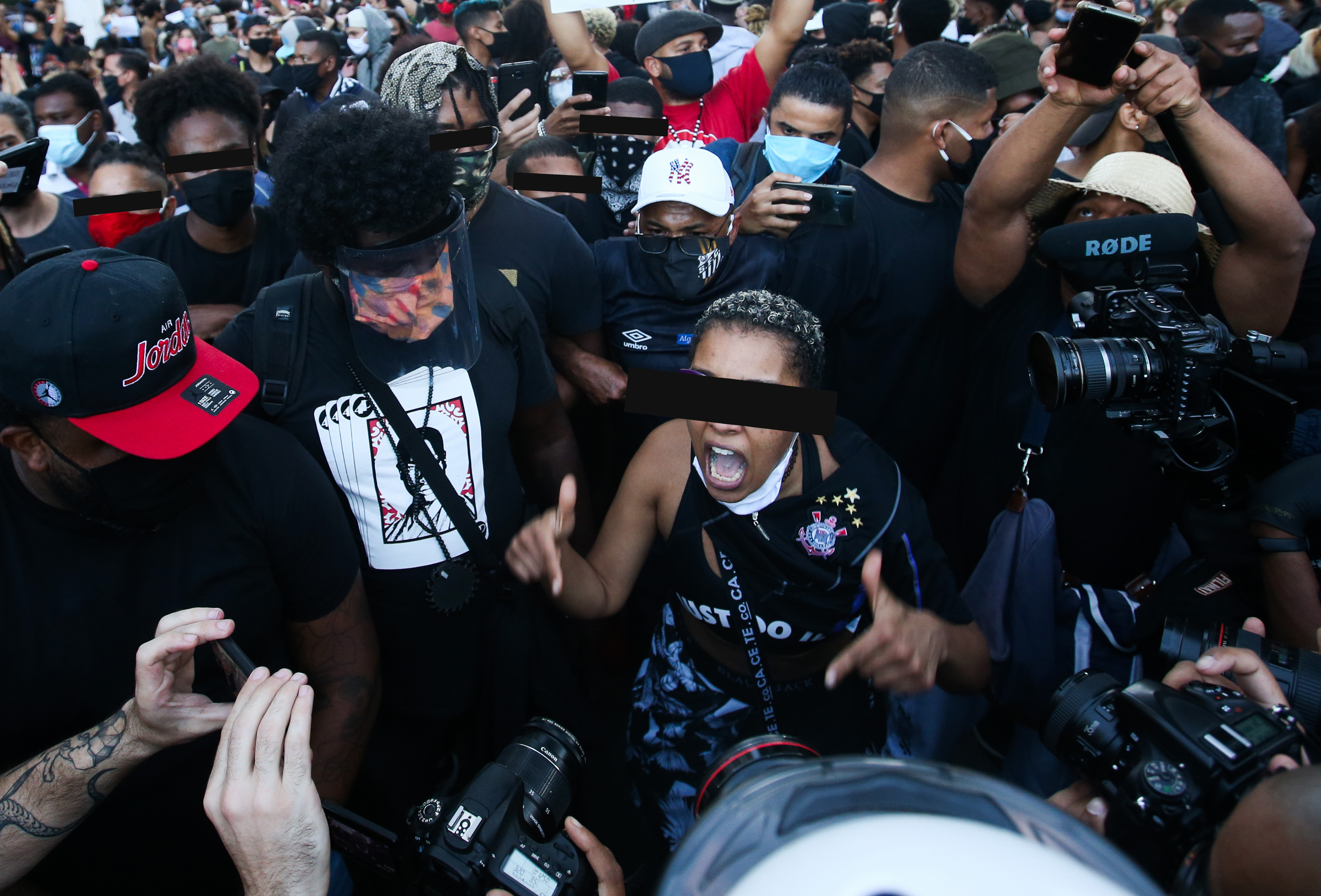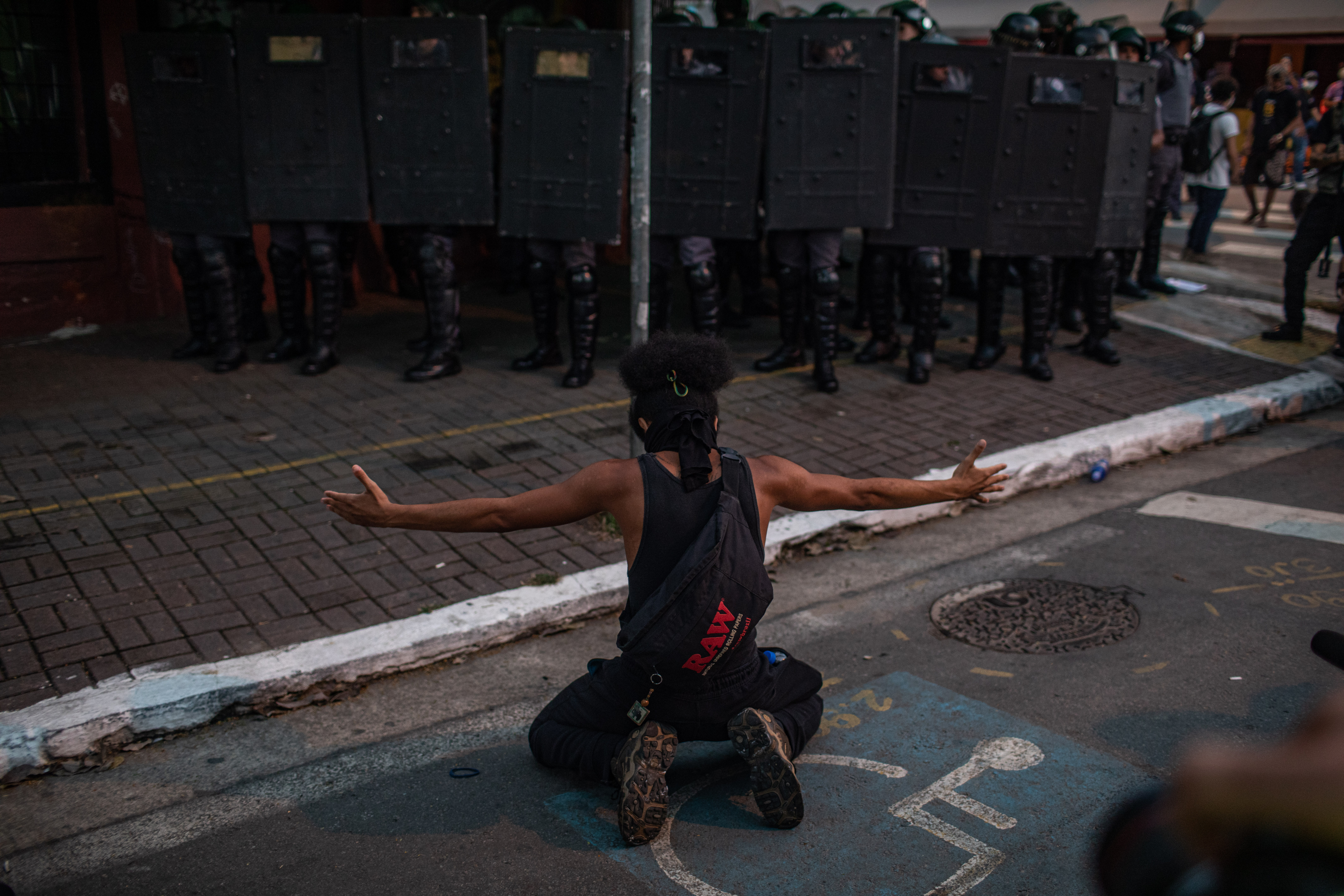For the second Sunday in a row, anti-fascist activists took to the streets throughout Brazil to protest against far-right President Jair Bolsonaro and, in particular, to protest for Black lives—in solidarity (and also motivated by) the protests in the US for George Floyd.
Among Bolsonaro’s supporters (and even members of his government) one can find several neo-Nazis, yet weekly protests have been organized throughout the country in support for the president.
“There are many parallels” between the protests in the United States and Brazil, says David Magalhães, International Relations professor at the Pontifical Catholic University of São Paulo.
“Both there and here, slave society has left us the damned legacy of structural racism. There are thousands of George Floyds on the favelas and outskirts of cities who are daily victims of police violence. Both there and here we have presidents who give prestige to structural racism, who treat Black movements as politically-corrected victimhood and [they both have] connections to a far-right that is hostile to minorities. Finally, they are two presidents who have reacted terribly to the pandemic and Black and poor people have been the main victims of COVID-19.”
The first protest took place in Rio de Janeiro—the city where the anti-racist character of the demonstrations is clearest. It was called in direct response to the murder of yet another young black man: Matheus Oliveira, a resident of the Catrambi favela killed by the Military Police with a shot to the head while he was returning home.
Oliveira was another victim of police violence—an issue which, on May 15 alone, killed 13 young people in the Alemão favela complex. A few days later, on May 18, 14-year-old João Pedro was playing at his cousin’s home in the favela complex of Salgueiro—a low-income municipality in São Gonçalo, on the outskirts of Rio de Janeiro—when a bullet hit him in the stomach during a police operation in the favela. On the 21st, Rodrigo Cerqueira, 19, was shot and killed in Morro da Providência—a favela in downtown Rio de Janeiro—during a police operation.

On Instagram, Raull Santiago, human rights and anti-racism activist from the Alemão favela complex, called for protests stating that “like our brothers and sisters in the Americas, we will echo that if there is no justice, there will be no peace for our executioners.”
“When someone dies, like João Pedro, Ághata, so many people, from adults to the elderly, society doesn’t even manifest itself to the point of trying to curb the level of this violence,” Santiago says. “So, we are here today because of history, during the COVID-19 pandemic, we once again had our bodies trapped between a virus and gunfire—and we no longer want death, murder, genocide [and] extreme violence as an option. That is our fight. We are here for our freedom, our lives, for the end of this racist structure of the country and the historical violence of the police.”
With the slogan #VidasNegrasImportam, a translation of #BlackLivesMatter, activists were targeted by police and treated with violence in several cities. Last week, the protest was harshly repressed in Rio de Janeiro and, in São Paulo, anti-fascists were assaulted by the Military Police when they came across a protest in support of president Bolsonaro, with neo-Nazis carrying flags of Ukraine and the Pravy Sektor (Right Sector political party).
The aggression against the anti-fascists, who had been summoned by organized supporters (Ultras) of the city’s football clubs, raised the alarm that state governments were losing control over the military police, whose sympathy for the president became increasingly obvious.
For months, supporters of the president have been carrying out protests in several cities. Thus far, there hasn’t been any kind of police violence there (even though they were circumventing the rules of social isolation imposed by governors).
On May 31, after the first anti-fascist and anti-racist protests were greeted with violence, military police and São Paulo’s Court of Justice quickly acted to try to make it illegal to protest for democracy and against racism—although, officially, the decision was to “avoid confrontation and damages” between supporters and opponents of the president.
The criminalization of protest, however, did not prevent further protests from taking place on Sunday, June 7. Most ended—despite tension—without major episodes of violence.

“I went for the first protest both as a journalist and as a favela resident [who is] tired of this violence… These protests show that everyone’s tired,” says Rennan Leta, who lives in the Alemão complex and is also a journalist at the Voz das Comunidades (Voice of Communities)—a pioneering community news outlet focused on the day-to-day of Rio de Janeiro’s most vulnerable communities.
“We’ve been over the edge for a long time. When a father of a family has his car perforated by 80 bullets, when a 14-year-old boy is killed wearing a school uniform, when an 8-year-old child is shot… all this is a sign that the state of necropolitics is a reality in Brazil. Because all these people had one thing in common: they lived in a favela. And just for that, they were killed by the police,” explains Leta.
Even in the middle of a pandemic, violence continues at its epicenter, where innocent people keep dying because of police action.
“To protest now is [not] an extreme attitude, but a response to an extreme situation,” explains political scientist Samuel Silva Borges. “Nobody is happy to take a risk. But the fight against authoritarianism has never been risk-free. The alternative would be what? Wait for the pandemic to pass? Leave it to 2021, after more than a million deaths? In short, the agenda of the protests gravitates around the fight against the Black genocide mobilized by the criminal system and the offensive against democracy (already extremely limited) that barely breathes in Brazil.”
“The government is doing absolutely nothing about this situation,” Leta asserts. “No measure that guarantees us the right to life and security—that’s why we went out on the street even with COVID-19.”







